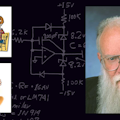Everybody knows the old statement by Yogi Berra: "Prediction is very hard...particularly of the future..." I love quotes like this. The mere fact that the guy who said this was physicist Niels Bohr, NOT Yogi Berra, does not affect the statement's validity. No matter who said it, prediction is a tough business....
I was reading about some executives who gave up on the conventional requirements for a "five-year plan" from their management team. They admitted that predictions as far out as five years were almost entirely baloney and bogus anyhow. But they were willing to accept a three-year plan.
And I recall some recent (1996) "experts" predicting that the semiconductor industry will not have any more boom/bust cycles. This industry analyst for a major stockbroker predicted that all lumps in the growth of our industry are now smoothed out. Constant, smooth, orderly expansion is assured. Of course, when the book-to-bill ratio recently went into the toilet and stayed there, I pointed out his folly. After all, 100 years ago, newspapermen asked J. P. Morgan, "What will the stock market do, Sir?" He wisely replied, "It will fluctuate..."
What can I predict? I can predict that many "experts" will continue to blithely promise that mixed-signal ICs (analog on the same chip as digital) are easier to design than you think.
I also can predict that the people who believe that foolishness will continue to try to make such mixed-signal ICs, using SPICE and other computerized, oversimplified analysis tools. It will be much HARDER than predicted to execute the ICs well.
What will be new in electronics in five years? Can I foresee what kind of computer we will be using? You may be using a hot new Septentium 777, running at 888 MHz. I'll still be running my old XT with the 386. I'll probably still be using 5.25-in. floppies. (I don't use a hard drive, just floppies and more floppies. Hey, I don't type very fast. I can't type at 777 MHz.)
It would be NICE if the Septentium had an option to cut the clock rate down to 8.88 MHz when all you are doing is just typing. That would be a neat way to extend battery life. But it's probably too much to ask, expecting computers to be designed with such a practical feature.
Meanwhile, I'll still be using my Alphasmart with a battery life of 60+ hours when I just want to type (http://www.alphasmart.com). (I gave my TRS-80 Model 120 to a guy who needed one. It didn't have enough memory to be useful.)
What will we be watching on TV? YOU may be watching NFL football on your 16:9 aspect-ratio, large-screen, high-fidelity, high-definition TV. I may be watching a soccer game on my old 13-in. machine (which I must admit does NOT have very many vacuum-tubes in it). After all, some wise person once said, "Soccer is the sport of the future—and it always will be."
Or, I may be editing some video from my most recent trek in Nepal. What will I be using for a camcorder? Digital? Naw. My guess is that the Sony TR-81 I just picked up will still be working fine. I bought a TR-51 that ran quite well for five years. But recently, it began having three different intermittent problems. After all, "end of usable life" does make some sense, as a concept. So I have retired it in favor of a "low mileage" TR-81 that's five years old, but "like new." It should be good for at least five more years of reliable service (I mean, my old TR-51 gave me not just five years of use, but hundreds of hours of recording and thousands of hours of playback.)
The new digital camcorders ARE nice and light. But if you add in the cassettes to record 12 hours, and the batteries to run that much, that package is NOT so light...not as light as mine. Will I still be using my old hand-crank generator to charge up my camcorder batteries (as I wrote up in Electronic Design, March 4, 1993, p. 105)? Naw, I got solar panels that weigh less and put out a lot more current on mostly sunny days.
What are WE gonna be driving in five years? YOU may be driving a car with 20 or 40 or 60 or 80 microprocessors. I'll probably be driving a 1970 Beetle with 256,000 miles on it. You know how many microprocessors THAT has in it.
Will we be buying electric cars? Several people recently asked my opinions of electric cars. I told them that the cars themselves are EXCELLENT. Whereas the lead-acid batteries are still HORRIBLE, too heavy, and too short-lived. The NiMH batteries are really pretty good, but I don't see the price coming out of the stratosphere to where they might be affordable. I mean, whenever somebody tells you about a new electric car with really good range, ask them the effective cost per mile of the lease. If it's cheaper than 20 cents per mile, I'll be astonished.
All for now. / Comments invited!
RAP / Robert A. Pease / Engineer
Please note NEW e-mail address:
[email protected].—or:
Mail Stop D2597A
National Semiconductor
P.O. Box 58090
Santa Clara, CA 95052-8090
About the Author

Bob Pease
Bob obtained a BSEE from MIT in 1961 and was a staff scientist at National Semiconductor Corp., Santa Clara, CA, for many years. He was a well known and long time contributing editor to Electronic Design.
We also have a number of PDF eBooks by Bob that members can download from the Electronic Design Members Library.